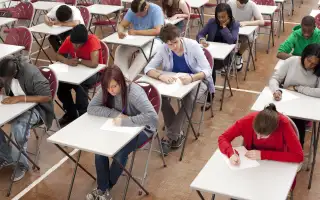Money Know-How? American Teens Are, Well, Just Average

For a country whose grandest export might be capitalism, we don’t do very well with our own kids. American teens land smack in the middle of the pack when it comes to simple personal financial know-how, according to a groundbreaking new global study.
Topping the list are kids in Shanghai, Belgium, Estonia, Australia and New Zealand. Bringing up the bottom are teens in Colombia, Italy, Slovak Republic, and Israel. The U.S. rates just below Latvia and ahead of France.
These findings come in the newly released 2012 Program for International Student Assessment (PISA), a widely recognized comparative measure of student proficiency in 65 countries. In the past, PISA has focused on math, science, and reading. For the first time, in 2012 it added testing on personal financial concepts.
Only 18 countries opted into the financial literacy component, which is a statement all by itself. This is a relatively new field of education and most countries have little more than a fledgling effort. Some who take it seriously and have broad financial education programs, like Australia and New Zealand, scored relatively well. But Shanghai, which is not regarded as a leader, produced the best results of all.
The assessment looked specifically at 15-year-olds. Those in Shanghai had a mean score of 603—well ahead of second-place Belgium (541) and 9th-place U.S. (492). In last place was Colombia’s mean score of 379. PISA is part of the Organization for Economic Co-operation and Development (OECD).
The 2012 results, eagerly awaited in education circles (and especially in financial education circles), were a bust in at least one big way. The goal is to figure out how to raise the financial I.Q. of people around the world by starting early and teaching in classrooms about budgets, credit cards, saving and investing. Asked what seems to work best, Michael Davidson, head of schools at the OECD, said, “The easy answer is we don’t know.”
The strong scores in Shanghai correlate with strong math scores there, he noted. But in other countries, the highest scores correlated with simply having a bank account. In general, strong financial literacy scores were also highly correlated with students demonstrating problem-solving skills and perseverance. So it may be that the best approach is a focus on math, offering kids some exposure to real world financial decisions and cultivating their will to ask questions and not give up so quickly in all spheres of life.
Among U.S. students, the OECD found that:
- A worse-than-average 17.8% do not reach even a baseline level of understanding about money concepts, meaning that at best such students will understand an invoice or the difference between a want and a need. They have little aptitude for even simple things like a basic budget or loan.
- A nearly average 9.4% is a top performer, meaning they understand things like fees and transactions costs and can make financial decisions with no immediate benefit but which will be good for them in the long run.
These are discouraging numbers, especially when weighed against the results in Shanghai, where just 2% of 15-year-olds do not reach the baseline and 43% are top performers—and efforts at formal financial education there are way behind those in the U.S.. With numbers like these, it’s the Chinese in Shanghai that soon may be exporting capitalism.